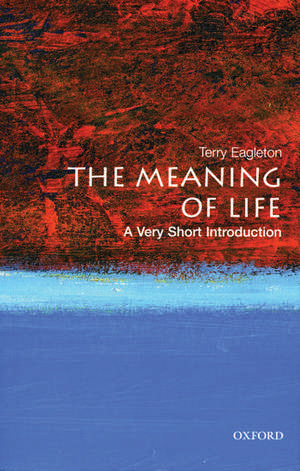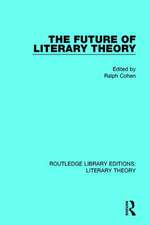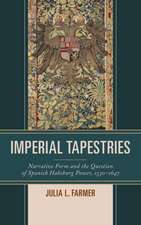The Meaning of Life: A Very Short Introduction: Very Short Introductions
Autor Terry Eagletonen Limba Engleză Paperback – 24 apr 2008
Eagleton first examines how centuries of thinkers and writers--from Marx and Schopenhauer to Shakespeare, Sartre, and Beckett--have responded to the ultimate question of meaning. He suggests, however, that it is only in modern times that the question has become problematic. But instead of tackling it head-on, many of us cope with the feelings of meaninglessness in our lives by filling them with everything from football to sex, Kabbala, Scientology, "New Age softheadedness," or fundamentalism. On the other hand, Eagleton notes, many educated people believe that life is an evolutionary accident that has no intrinsic meaning. If our lives have meaning, it is something with which we manage to invest them, not something with which they come ready made. Eagleton probes this view of meaning as a kind of private enterprise, and concludes that it fails to holds up. He argues instead that the meaning of life is not a solution to a problem, but a matter of living in a certain way. It is not metaphysical but ethical. It is not something separate from life, but what makes it worth living--that is, a certain quality, depth, abundance and intensity of life.
Here then is a brilliant discussion of the problem of meaning by a leading thinker, who writes with a light and often irreverent touch, but with a very serious end in mind.
About the Series: Combining authority with wit, accessibility, and style, Very Short Introductions offer an introduction to some of life's most interesting topics. Written by experts for the newcomer, they demonstrate the finest contemporary thinking about the central problems and issues in hundreds of key topics, from philosophy to Freud, quantum theory to Islam.
Din seria Very Short Introductions
-
 Preț: 47.44 lei
Preț: 47.44 lei -
 Preț: 47.01 lei
Preț: 47.01 lei -
 Preț: 41.42 lei
Preț: 41.42 lei -
 Preț: 46.09 lei
Preț: 46.09 lei - 5%
 Preț: 56.93 lei
Preț: 56.93 lei -
 Preț: 56.76 lei
Preț: 56.76 lei -
 Preț: 56.70 lei
Preț: 56.70 lei -
 Preț: 46.72 lei
Preț: 46.72 lei - 17%
 Preț: 51.73 lei
Preț: 51.73 lei - 18%
 Preț: 51.45 lei
Preț: 51.45 lei - 18%
 Preț: 51.54 lei
Preț: 51.54 lei - 17%
 Preț: 51.82 lei
Preț: 51.82 lei - 17%
 Preț: 52.08 lei
Preț: 52.08 lei - 17%
 Preț: 51.63 lei
Preț: 51.63 lei - 17%
 Preț: 52.16 lei
Preț: 52.16 lei - 17%
 Preț: 52.11 lei
Preț: 52.11 lei - 17%
 Preț: 51.73 lei
Preț: 51.73 lei - 18%
 Preț: 51.45 lei
Preț: 51.45 lei - 17%
 Preț: 52.26 lei
Preț: 52.26 lei - 17%
 Preț: 51.91 lei
Preț: 51.91 lei - 17%
 Preț: 51.73 lei
Preț: 51.73 lei - 18%
 Preț: 50.75 lei
Preț: 50.75 lei - 17%
 Preț: 51.82 lei
Preț: 51.82 lei - 18%
 Preț: 51.19 lei
Preț: 51.19 lei - 17%
 Preț: 51.63 lei
Preț: 51.63 lei - 30%
 Preț: 43.88 lei
Preț: 43.88 lei - 17%
 Preț: 51.63 lei
Preț: 51.63 lei -
 Preț: 67.80 lei
Preț: 67.80 lei - 17%
 Preț: 51.63 lei
Preț: 51.63 lei - 17%
 Preț: 51.91 lei
Preț: 51.91 lei - 17%
 Preț: 51.63 lei
Preț: 51.63 lei - 17%
 Preț: 51.82 lei
Preț: 51.82 lei - 17%
 Preț: 51.73 lei
Preț: 51.73 lei - 18%
 Preț: 51.28 lei
Preț: 51.28 lei - 17%
 Preț: 51.63 lei
Preț: 51.63 lei - 17%
 Preț: 51.63 lei
Preț: 51.63 lei - 17%
 Preț: 52.16 lei
Preț: 52.16 lei - 18%
 Preț: 51.28 lei
Preț: 51.28 lei - 18%
 Preț: 51.00 lei
Preț: 51.00 lei - 17%
 Preț: 52.42 lei
Preț: 52.42 lei - 18%
 Preț: 51.00 lei
Preț: 51.00 lei - 17%
 Preț: 52.16 lei
Preț: 52.16 lei - 18%
 Preț: 51.45 lei
Preț: 51.45 lei - 17%
 Preț: 51.82 lei
Preț: 51.82 lei - 17%
 Preț: 52.16 lei
Preț: 52.16 lei - 17%
 Preț: 51.91 lei
Preț: 51.91 lei - 17%
 Preț: 52.08 lei
Preț: 52.08 lei - 17%
 Preț: 52.43 lei
Preț: 52.43 lei - 17%
 Preț: 52.26 lei
Preț: 52.26 lei - 17%
 Preț: 51.63 lei
Preț: 51.63 lei
Preț: 51.19 lei
Preț vechi: 62.29 lei
-18% Nou
9.79€ • 10.26$ • 8.12£
Carte disponibilă
Livrare economică 08-14 martie
Livrare express 05-11 martie pentru 25.75 lei
Specificații
ISBN-10: 0199532176
Pagini: 128
Ilustrații: 12 black and white halftones
Dimensiuni: 111 x 174 x 8 mm
Greutate: 0.11 kg
Editura: Oxford University Press
Colecția OUP Oxford
Seria Very Short Introductions
Locul publicării:Oxford, United Kingdom
Descriere
The phrase "the meaning of life" for many seems a quaint notion fit for satirical mauling by Monty Python or Douglas Adams. But in this spirited Very Short Introduction, famed critic Terry Eagleton takes a serious if often amusing look at the question and offers his own surprising answer.
Eagleton first examines how centuries of thinkers and writers--from Marx and Schopenhauer to Shakespeare, Sartre, and Beckett--have responded to the ultimate question of meaning. He suggests, however, that it is only in modern times that the question has become problematic. But instead of tackling it head-on, many of us cope with the feelings of meaninglessness in our lives by filling them with everything from football to sex, Kabbala, Scientology, "New Age softheadedness," or fundamentalism. On the other hand, Eagleton notes, many educated people believe that life is an evolutionary accident that has no intrinsic meaning. If our lives have meaning, it is something with which we manage to invest them, not something with which they come ready made. Eagleton probes this view of meaning as a kind of private enterprise, and concludes that it fails to holds up. He argues instead that the meaning of life is not a solution to a problem, but a matter of living in a certain way. It is not metaphysical but ethical. It is not something separate from life, but what makes it worth living--that is, a certain quality, depth, abundance and intensity of life.
Here then is a brilliant discussion of the problem of meaning by a leading thinker, who writes with a light and often irreverent touch, but with a very serious end in mind.
About the Series: Combining authority with wit, accessibility, and style, Very Short Introductions offer an introduction to some of life's most interesting topics. Written by experts for the newcomer, they demonstrate the finest contemporary thinking about the central problems and issues in hundreds of key topics, from philosophy to Freud, quantum theory to Islam.
Recenzii
Light hearted but never flippant.
Wonders never cease. This is popular philosophy by an amateur in the best sense of the word, a man who clearly loves the stuff and writes plain English...[Eagleton] makes his case well and with a light touch.
It is a stimulating and often entertaining, if at times rather breathless, Cook's tour around the chief monuments of western philosophy and literature...The Meaning of Life is unusual and refreshing.
[Eagleton] makes his case well and with a light touch... I stand convinced.
A lively starting point for late-night debate.
Warm intellectual pleasure...meticulous treatment of the subject...It looks like Eagleton got it right.
The name Terry Eagleton...assures us of stimulation, style, sparkling, sometimes acerbic, wit, and wide-ranging erudition. In other words he is eminently readable...[a] commendably pocket-sized book.
Notă biografică
Terry Eagleton is John Edward Taylor Professor of English at the University of Manchester. His recent publications include Holy Terror (2005); The English Novel: An Introduction (2004); After Theory (2003); Sweet Violence: The Idea of the Tragic (2002); The Idea of Culture (2000); The Illusions of Postmodernism (1996); and Literary Theory: An Introduction (2nd edition, 1996).












